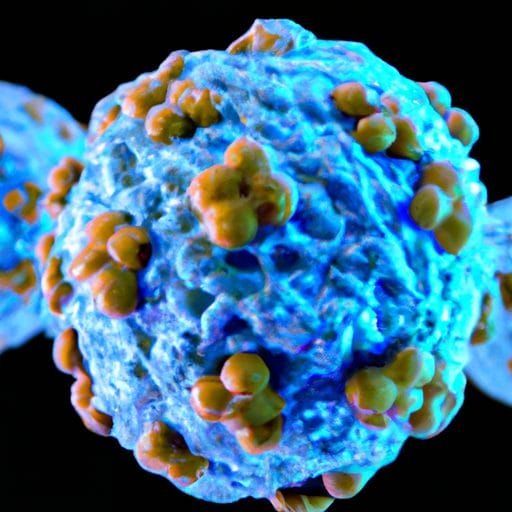Chicken pox or chickenpox virus is a highly contagious disease predominantly affecting children, though adults are not immune to it. Caused by the varicella-zoster virus, it is characterized by itchy red spots or blisters all over the body. The disease is generally mild but can pose serious risks to certain demographics, such as pregnant women, newborns, and individuals with a weakened immune system.
Key Takeaways
- Chicken pox is caused by the varicella-zoster virus.
- It is highly contagious and spreads easily.
- Vaccination is available and is the best preventive measure.
- Treatment primarily involves managing symptoms.

Causes of Chicken Pox
Chicken pox is primarily caused by the varicella-zoster virus. This virus is part of the herpesvirus family and is airborne, meaning it spreads through the air via droplets from a cough or sneeze. It can also be contracted by touching a blister or the liquid inside it.
How it Spreads
- Person to Person: The disease is highly contagious and can spread quickly from one person to another.
- Touch: Touching the fluid from a chickenpox blister can also transmit the disease.
- Airborne Transmission: It can spread through the air when an infected person coughs or sneezes.
Symptoms and Diagnosis
Recognizing the Symptoms
The initial symptoms of chicken pox include fever, tiredness, and a general feeling of being unwell. This is soon followed by the appearance of the characteristic itchy rash. The rash passes through three phases: red bumps, fluid-filled blisters, and scabs.
Diagnosis Procedure
Diagnosis is typically straightforward due to the distinctive skin rash itself. However, in certain cases, a doctor might recommend laboratory tests to confirm the diagnosis.
Recognizing the Symptoms
The initial symptoms of chicken pox include fever, tiredness, and a general feeling of being unwell. This is soon followed by the appearance of the characteristic itchy rash. The rash passes through three phases: red bumps, fluid-filled blisters, and scabs. More detailed information about the various symptoms of a chickenpox infection, can be found here.
Diagnosis Procedure
Diagnosis is typically straightforward due to the distinctive rash. However, in certain cases, a doctor might recommend laboratory tests to confirm the diagnosis. It is crucial to consult a healthcare provider if you suspect symptoms may be chicken pox, especially considering the potential for complications and the highly contagious nature of the disease.
Treatment and Prevention
Medications and Home Remedies
Once a person is infected with the virus, the focus of the treatment is on alleviating symptoms, particularly the itchy rash. Antihistamines and calamine lotion are commonly used to relieve itching. For more severe cases, antiviral medications might be prescribed, especially for individuals at risk of complications.
Vaccination: The Best Preventive Measure
Vaccination is the most effective way to prevent chicken pox. The varicella vaccine is recommended and is often administered in two doses, with the first dose given at ages 12-15 months and the second at ages 1 to 2 and 4-6 years. It’s crucial to adhere to vaccination schedules to safeguard children’s health, which you can read more about in this Children’s Health section.
Complications of Chicken Pox
Risks and Common Complications
Chicken pox is generally a mild disease but can lead to serious complications sometimes, especially in adults, infants, and individuals with weakened immune systems. Bacterial infections of the skin, pneumonia, and encephalitis are some of the potential complications that can arise from a chicken pox infection.
Long-Term Effects: Shingles
Once recovered from chicken pox, the virus remains dormant in the body and can reactivate later in life, causing shingles. Shingles is characterized by a painful rash and is more common in older adults and individuals with a compromised immune system.
Living with Chicken Pox
Daily Life and Management
Managing chicken pox involves addressing the itchiness and discomfort caused by the rash and preventing the spread to others. Keeping nails short, wearing mittens, and using calamine lotion can help manage itchiness and prevent secondary infections from scratching.
Impact on School and Work
Children with chicken pox are usually required to stay home from school to avoid spreading the virus. Adults who contract the virus may also need to take time off work to recover and prevent outbreaks in the workplace.
Recovery and Immunity
The Healing Process
Recovery from chicken pox typically takes about 5-10 days, and once recovered, the individual usually gains immunity from the virus. The blisters dry out and scab over in 1 to 2 days, and once all the blisters and scabs fall off, the individual is no longer contagious. It’s essential to avoid scratching to prevent scars. For tips on managing itchy skin during recovery, you can read this article.
Future Immunity and Re-infection
While re-infection with the virus is rare, it is possible, especially in individuals with compromised immune systems. However, subsequent infections are typically milder than the initial infection.
Frequently Asked Questions (FAQ) Section
Q1: Can Adults Get Chicken Pox?
A1: Yes, adults can get chicken pox, and the disease tends to be more severe in adults than in children.
Q2: Is it Possible to Get Chicken Pox Even After the Chicken Pox Vaccine?
A2: While rare, it is possible to get chicken pox after vaccination. However, the disease is usually milder with fewer blisters and mild or no fever.
Q3: Can Chicken Pox Be Prevented?
A3: Vaccination is the best method to prevent chicken pox. The varicella vaccine is over 90% effective at preventing chicken pox. So get the chickenpox vaccine!
Conclusion
Chicken pox is a common disease, particularly among children. While it is generally mild, complications can arise, and certain demographics may experience severe symptoms. The chickenpox vaccine remains the most effective preventive measure, and recovery usually provides immunity. Understanding the disease, its symptoms, and management strategies is crucial for navigating through the infection period effectively and minimizing discomfort.






